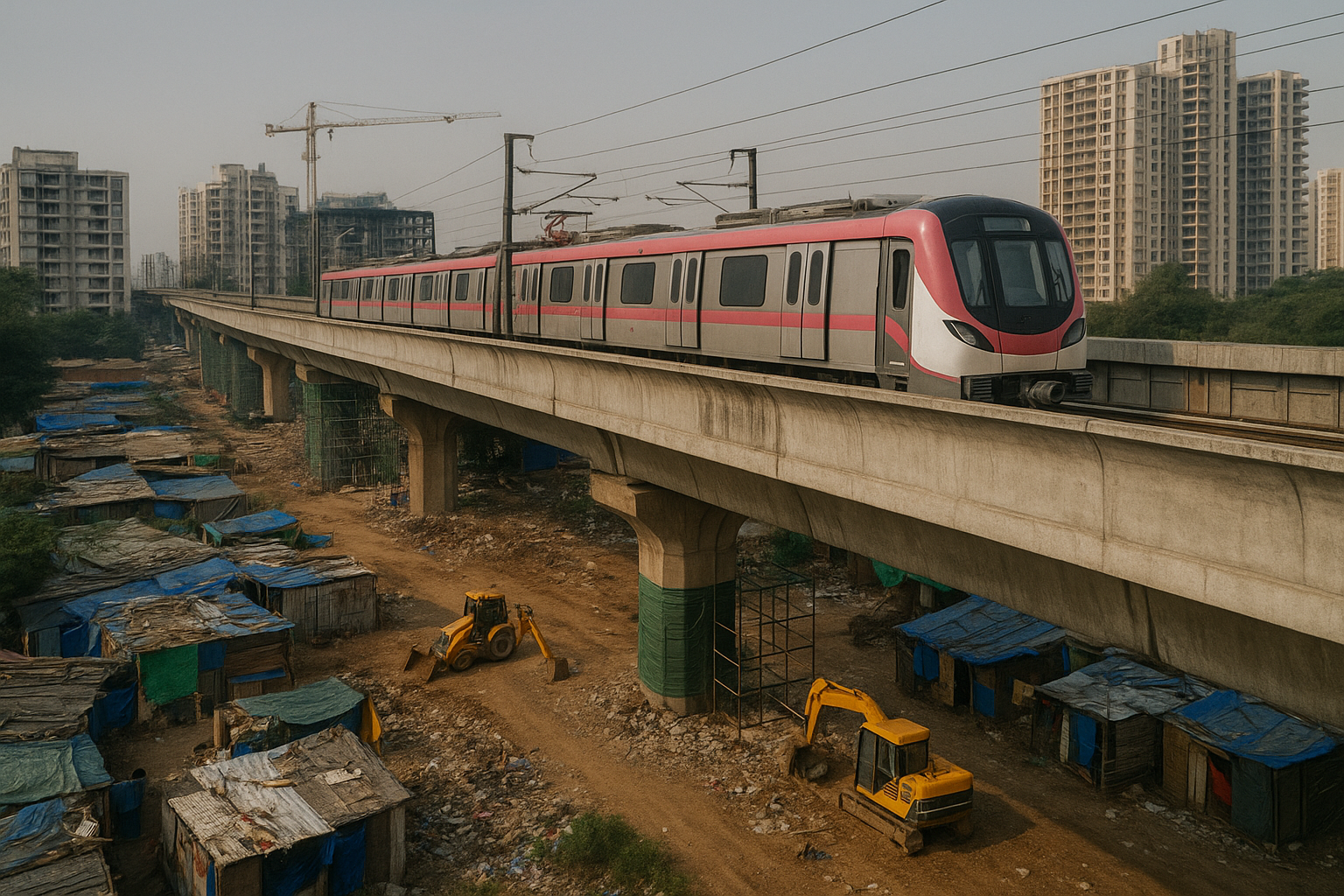ADB’s Peace Train: Settling the Delhi–Meerut Transit Row with Relocation & Repair
Residents of a New Delhi colony filed a complaint against the Delhi–Meerut RRTS project, citing structural, environmental, and safety concerns after their homes were excluded from acquisition. ADB’s Office of the Special Project Facilitator mediated a resolution through compensation, relocation support, and structural safeguards, enabling construction to proceed.

India’s ambitious Delhi–Meerut Regional Rapid Transit System (RRTS) is a hallmark of modern infrastructure planning, designed to revolutionize regional mobility in the National Capital Region. Backed by a $1 billion loan from the Asian Development Bank (ADB) and co-financed by the Asian Infrastructure Investment Bank and the New Development Bank, the 82-kilometer corridor is expected to serve nearly 800,000 passengers daily by June 2025. The project was guided by research inputs from prestigious institutions such as the Central Road Research Institute (CRRI) and the Indian Institute of Technology (IIT) Roorkee, adding technical credibility to the alignment and execution of this high-speed commuter rail line. While the project promised to reduce congestion, pollution, and travel time, especially for women who undertake multiple short trips daily, its real-world rollout was soon disrupted by tensions on the ground.
Unexpected Exclusion Sparks Residential Dissent
Trouble began in a New Delhi colony when the National Capital Region Transport Corporation (NCRTC), the public sector body implementing the RRTS, initially notified 24 apartments across three residential blocks for acquisition. These homes were considered to fall within the project’s “impact zone.” However, as the rail alignment was revised, only eight apartments were deemed directly affected and subject to purchase. The remaining 16 households were abruptly excluded, a development that, rather than easing concerns, ignited them. Residents of the unacquired homes raised fears of noise pollution, constant vibrations from passing trains, and significant visual intrusion from the massive elevated viaduct. Many feared that the long-term presence of such infrastructure would devalue their properties and compromise safety for children and elderly residents. The complainants also criticized NCRTC for a lack of transparency and consultation, particularly regarding the revised design and potential alternatives that could have reduced the project's environmental and social impact.
Taking the Fight to ADB’s Accountability Mechanism
Frustrated with local grievance procedures, the residents turned to ADB’s Accountability Mechanism and filed a formal complaint in July 2022. They chose to engage with the Office of the Special Project Facilitator (OSPF), which specializes in problem-solving through independent mediation. While ADB’s policy required complainants to first seek resolution with the project team, ongoing disagreement over five months pushed OSPF to formally intervene in January 2023. In a crucial gesture of goodwill, NCRTC agreed to temporarily delay construction in the colony to allow the mediation process to unfold. This act, though voluntary, created essential breathing space for diplomatic engagement, even though OSPF had no legal authority to suspend the project.
Independent Experts and Courts Weigh In
As positions hardened, OSPF adopted a shuttle diplomacy approach, holding separate discussions with the complainants and NCRTC, as mutual distrust prevented joint meetings. To ensure impartiality, OSPF commissioned an independent expert review of the alignment and its compliance with ADB’s 2009 Safeguards Policy Statement. While an alternative alignment outside the colony was deemed technically possible by a committee of experts from the Ministry of Urban Development, the OSPF-hired specialists concluded that such an alternative would result in greater environmental and social disruption. They found the current alignment to be the least harmful and within the policy framework. Meanwhile, residents pursued legal relief in Indian courts. The judiciary upheld NCRTC’s decision, stating that development decisions taken after due evaluation of multiple options would not be interfered with. An appeal was also dismissed, further narrowing the residents’ options.
Compromise, Compensation, and a Way Forward
Following the legal setbacks and expert findings, OSPF encouraged residents to shift their strategy from seeking the acquisition of their homes to negotiating for mitigation measures. Although initially met with resistance, this pragmatic path gradually gained traction. Months of negotiations, persistent OSPF shuttle diplomacy, and renewed discussions led to a breakthrough in February 2024. A memorandum of understanding (MOU) was signed between NCRTC and eight of the 16 complainant households. The agreement included support for temporary relocation, covering rental payments, utility bills, and moving expenses. Crucially, it also provided for a baseline structural stability survey by an independent engineer from a reputable institute, funded by OSPF, to document the condition of buildings before and after construction. NCRTC is further committed to repairing any damage verified by the post-construction report. The MOU also covered cosmetic upgrades to building exteriors, including painting, plastering, pipe replacements, and common stairwell repairs. For the eight households that chose not to sign the agreement or relocate, OSPF secured NCRTC’s commitment to ensure safe and uninterrupted access to their homes and implementation of environmental protection measures during construction. Preconstruction surveys were completed for 14 of the 16 apartments by June 2024, with post-construction findings to guide further action. Significantly, NCRTC used the MOU’s framework to negotiate with residents from other blocks marked for acquisition, showing the broader strategic value of the OSPF-mediated deal.
In the end, OSPF’s involvement not only prevented further delays to a project already behind schedule by 18 months but also ensured that the voices of affected citizens were heard, their concerns addressed to a feasible extent, and the ADB’s reputation safeguarded. While not everyone got exactly what they wanted, the resolution struck a balance between development imperatives and community concerns, underscoring the importance of transparent mediation and neutral facilitation in navigating the human complexities of large-scale infrastructure development.
- FIRST PUBLISHED IN:
- Devdiscourse
ALSO READ
ADB Approves $100M Aid Package to Support Recovery and Resilience in Myanmar
Pakistan's Economic Resurgence: Securing $1 Billion with ADB's Backing
ADB Approves $400M for Climate-Resilient Inclusive Development in Bangladesh
ADB Injects $500M to Reform Bangladesh Banks, Slash NPLs and Boost Inclusion
India-US Trade Talks Hit Roadblock Over Tariffs










